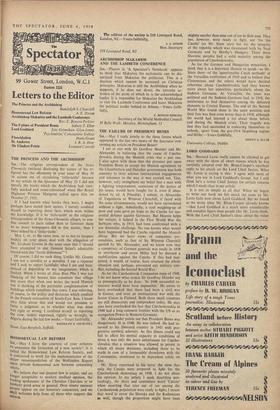THE FAILURE OF PRESIDENT BENES
SIR,—May I reply jointly to the three letters which appeared in the last two issues of the Spectator con- cerning my article on President Benes?
I am at one with Sir Geoffrey Mander and Mr. Alexander in believing that the cause of Czecho- slovakia during the Munich crisis was a just one. I also agree with them that the pressure put upon President Benes to accept the Munich agreement by the Chamberlain and Daladier governments was both contrary to their solemn international engagements and inhuman in the way it was carried out. This, however, only strengthens my belief that a man with a fighting temperament, conscious of the justice of his cause, would have fought for it, even if aban- doned by all. A Pilsudski, I submit, or Alexander of Yugoslavia or Winston Churchill, if faced with the same circumstances, would not have surrendered without a fight. Admittedly, a cool weighing-up of pros and cons gave no hope to the Czechs for suc- cessful defence against Germany. But Heaven helps the valiant; it helped in the First World War the Serbians who, in 1914, had been confronted with a not dissimilar challenge. No one knows what would have happened had the Czechs rejected the Munich diktat. But we have views of competent per- sonalities, such as that of Sir Winston Churchill quoted by Mr. Alexander, and we know now that a conspiracy of German generals was ready in 1938 to overthrow and arrest Hitler had he decreed a mobilisation against the Czechs. If this had hap- pened, it would, of course, have reversed the whole situation and, perhaps, prevented any military con- flict, including the Second World War.
As for the Czechoslovak Communist coup of 1948, I do not know what makes Sir Geoffrey Mander say as peremptorily as he does : 'In 1948 successful re- sistance would have been impossible.' He seems to have overlooked that there had been a civil war in Greece, and even an international war with the Soviet Union in Finland. Both these small countries are still democratic and independent today. He may also have overlooked the fact that Czechoslovakia in 1948 had a long common frontier with the US as art occupation Power in Western Germany.
Mr. Alexander points out that President Benes was dangerously ill in 1948. He was indeed. He had re- turned to his liberated country in 1945 with pro- gressive cerebral sclerosis. As this illness could not fail to affect his mental capacity in conditions of stress it was only the more unfortunate for Czecho- slovakia that a situation 'was allowed to persist in which all major decisions, including those to be made in case of a foreseeable showdown with the Communists, continued to be dependent solely on him.
Mr. Sinor expressed in his letter the view that only the Czechs were prepared to fight for the Czechoslovak democracy in 1938. I do not share his opinion. In my article I used, doubtless mis- leadingly, the short and convenient word 'Czechs' when asserting that nine out of ten among the Czechoslovak population were ready to fight; I meant that word to cover the Slovaks and the Ruthenians as well, though the proportion might have been slightly smaller than nine out of ten in their case. They too, however, were ready to fight, not 'for the Czechs' (as Mr. Sinor says) but for the integrity of the republic which was threatened both by Nazi Germany and by Horthy's Hungary. These three Slavonic peoples had a solid majority among the population of Czechoslovakia.
As for the German and Hungarian minorities, I think that it is a historical illusion to speak—as Mr. Sinor does—of the 'questionable Czech methods' at the Versailles conference of 1919 and to believe that Clemenceau and the others would have decided otherwise about Czechoslovakia had they known more about her minorities, particularly about the Sudeten Germans. At Versailles, the issue was political and the Sudeten Germans had, in 1918, the misfortune to find themselves among the defeated elements in Central Europe. The end of the Second World War found them in the same position and their fate was then even worse than in 1918, although the world had learned a lot about them before and during the Munich crisis. Their tragedy was that they had succeeded in endearing themselves to nobody, apart from the pre-1914 Hapsburg regime and Hitler:—Yours faithfully,










































 Previous page
Previous page